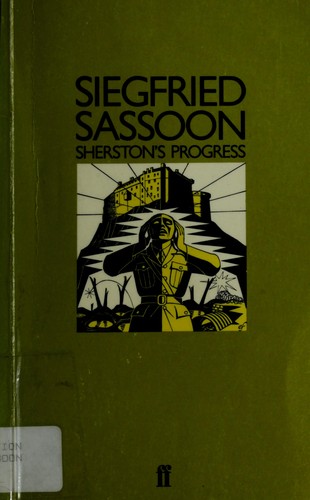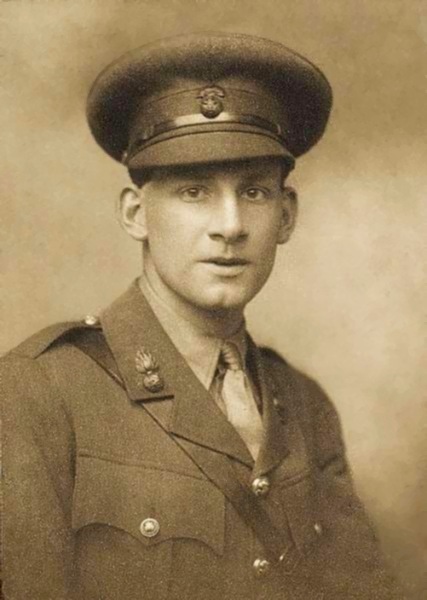There’s a lot we can reflect on as we approach the 100th anniversary of the official beginning of the war Siegfried Sassoon fought in, one routinely referred to as “The Great War,” a war in which some of the more conservative estimates say over eight million soldiers died, and it’s much more than the deluge of articles that no doubt awaits us, and the Twitter accounts that will no doubt spring up to “live tweet” the seminal moments of the war can tell us. Several publishers will unveil new books on the combatants and the battles they fought in, and undoubtedly a few books from the era and ones that documented the after-effects of what was naively called, “The war to end wars,” will also be put back onto bookshelves for the first time in decades. There will be books that deal with the gallantry, the death and destruction, and what came after, when the world tried to pick up the pieces and start the healing process as old empires crumbled and new ones emerged. But Sassoon, who wrote of his life before and after his service fighting for his country in his George Sherston trilogy of novels (Memoirs of a Fox-Hunting Man, Memoirs of an Infantry Officer, and Sherston’s Progress) in what he referred to as “The real War, that big bullying bogey,” might have done the best job of showing future readers just how much irreparable damage constant fighting can do to a supposedly great nation. Reading those books as an American in 2014, after over a decade of false “Mission Accomplished” claims and what feels like an eternal winding down of combat operations, and knowing what I know about the sun setting on the British Empire after the world wars, I can only think of America’s own rapid decline at home and in the eyes of the rest of the word after years of our own aggression and conquest. How wars diminishes greatness and cause damage and destruction that can’t ever be undone.
In July of 1917, a little over a year before the official end of the First World War, Sassoon, a member of the wealthy Sassoon merchant family and 2nd lieutenant in the British Army, composed a letter with the help of his friends Bertrand Russell and John Middleton Murry. Addressed to his commanding officer, Sassoon, who had been awarded a Military Cross a year earlier for “gallantry during a raid on the enemy’s trenches,” titled the letter, “Finished with the War: A Soldier’s Declaration.” Written “on behalf of all those who are suffering now,” Sassoon penned his “willful act of defiance” because he had come to believe “that the war upon which I entered as a war of defence and liberation has now become a war of agression and conquest.” Eventually, thanks in large part to his friend, fellow soldier, and Good-Bye to All That author, Robert Graves, Sassoon avoided court-martial after it was decided that Sassoon suffered from shell shock and needed to be treated rather than tried. When you consider the fact that shell shock was sometimes looked on as an act of cowardice, something that 266 British soldiers were executed for throughout and after the war (all were given posthumous conditional pardon in 2006), Sassoon got off easy. But the ghosts of the war never stopped haunting him, and they never stopped haunting his country as well.
 Hopefully this doesn’t spoil the outcome of Piers Brendon’s The Decline and Fall of the British Empire for you, but after over 215 (in Brendon’s estimation, from 1781 to 1997) years of stretching the country’s power and influence from small trading posts all over the globe to dominions, colonies, and various other territories, the British Empire crumbled through a combination of growing anti-colonial movements and the country’s own financial woes after a costly Second World War. Yet just a few years before the slow post-war decline began, the Empire was at its largest: covering nearly a quarter of the Earth’s total land and ruling over an estimated 458 million people, that was the England Sassoon fought for.
Hopefully this doesn’t spoil the outcome of Piers Brendon’s The Decline and Fall of the British Empire for you, but after over 215 (in Brendon’s estimation, from 1781 to 1997) years of stretching the country’s power and influence from small trading posts all over the globe to dominions, colonies, and various other territories, the British Empire crumbled through a combination of growing anti-colonial movements and the country’s own financial woes after a costly Second World War. Yet just a few years before the slow post-war decline began, the Empire was at its largest: covering nearly a quarter of the Earth’s total land and ruling over an estimated 458 million people, that was the England Sassoon fought for.
Empires—or one organized political authority holding sway over other states or countries that are separate, be it militarily, economically, through ideology, religion, or otherwise—are the ultimate examples of something being deemed “Too big to fail.” You don’t expand with the idea of having everything collapse, but as history shows, no one empire can truly last forever; the Holy Roman Empire is no more, there is no Ottoman Empire, The Soviet Union fell apart, and although it was once believed the sun would never set on the British Empire, it did over time. Even though England looked, on paper, at its healthiest in the years when Sassoon published his trilogy (1928, 1930, and 1938), what was taking place, and what the Sherston trilogy highlighted, whether he realized it or not, was the end of England as an empire, both inside and outside. Before Charles Ryder would revisit Brideshead as a soldier; before the Kinks would write songs like “Victoria” and sing about how they missed the village green; before Edward St. Aubyn would write so brilliantly of the agonizing downfall of the English upper-class as seen through the eyes of Patrick Melrose; and eighty years before Julian Fellowes would use the same time period as Sassoon for Downton Abbey to paint a picture of how the English aristocracy dealt with the rapidly changing times, the George Sherston books not only perfectly surmised the horror as well as the drudgery of a soldier’s life during the war (in the second book, Memoirs of an Infantry Officer, Sherston calls an ordinary officer’s life “tedious and repetitional”), but also gave us a more bucolic picture of an England before the war in the first book, Memoirs of a Fox-Hunting Man. By the third and final novel, Sherston’s Progress, which came out in the last days of the Second World War in 1945, we see Sassoon’s fictional stand-in start the book in Scotland to recover, then he’s sent by the army to the Middle East, and finally back to France to fight as part “of the war machine which needed so much flesh and blood to keep it working.” The book ends with Sherston in a hospital with a “half-healed hole” in his head from a German bullet, thinking, “My war had stopped, but its after-effects were still with me.” Things for Sherston could never be the same, just like Sassoon and his country would never go back to the way things were.
As I closed the last of Sassoon’s books, I began to draw parallels to my own country’s numerous problems after endless wars, skirmishes, and prolonged abstract conflicts given scary names (i.e., the Cold War, the War on Drugs, the War on Terror) that we’re still stuck in. War eats away at empire, no matter if the country wins or loses in the end. More often than not, the repercussions of violence don’t wait long to surface. England looked like it was at its largest after the first of the two World Wars, but by the second, it was in decline. Today, that war machine that Sassoon knew needed so much flesh and blood keeps working, and the effects of endless war already haunt us at home and abroad. When I was a child, we were still trading threats with the Soviets, involving ourselves in other countries’ business, and trying to move past too many years and too many deaths in Vietnam; it wasn’t peaceful, but we weren’t at war. I didn’t ride horses and hunt foxes like Sassoon’s Sherston, and I’d hardly compare America’s live fast 1980s with the tranquility of Edwardian England, but I feel like I had some sense of peace once, and I miss what little bit of it I could understand and appreciate.
 I’ve never fought in a war, never known the sort of terror a soldier must feel, but I never really felt an overwhelming sense of patriotism when our leaders said we were sending our citizens to fight the good fight either. That’s the sort of thing that motivated Sassoon to give up idle days writing poetry and playing cricket alongside Arthur Conan Doyle at the Nevill Ground in Kent. He fought in a war and experienced the horrors of it, eventually realizing no good could come of all the fighting no matter how much his country told him it was for a good cause. And as his trilogy of books show, war meant you could never go back to the way things were, all you could hope for was your country could come out of it with its soul intact. It’s a lesson that I sometimes fear my own country missed its chance to learn.
I’ve never fought in a war, never known the sort of terror a soldier must feel, but I never really felt an overwhelming sense of patriotism when our leaders said we were sending our citizens to fight the good fight either. That’s the sort of thing that motivated Sassoon to give up idle days writing poetry and playing cricket alongside Arthur Conan Doyle at the Nevill Ground in Kent. He fought in a war and experienced the horrors of it, eventually realizing no good could come of all the fighting no matter how much his country told him it was for a good cause. And as his trilogy of books show, war meant you could never go back to the way things were, all you could hope for was your country could come out of it with its soul intact. It’s a lesson that I sometimes fear my own country missed its chance to learn.
Follow Vol. 1 Brooklyn on Twitter, Facebook, Google +, our Tumblr, and sign up for our mailing list.

